The main defender of the militants Idlib - Mr. Erdogan?
However, it has not yet come down to major military operations, which is probably related to the opening of the international summit on Syria on the 7 of September of the 2018 of September.
According to the UN, and according to the Russian Foreign Ministry, in addition to 3 million civilians, from 10 to 30, thousands of militants representing various anti-government groups are concentrated in the idlib de-escalation zone in the north of the Syrian Arab Republic.
Recently, however, Turkey has been the main opponent of the joint plan of the offensive by the government forces of Syria and the Russian VKS against this Islamist enclave. That is, a state that suffered a financial blow from the United States and recently exposed itself almost as Russia's main ally in the Middle East is now ready to help militants concentrated in Idlib with military force?
Why did this happen? Let's try to figure it out.
As we remember, after a series of successful offensive operations carried out recently by the Syrian government army, a new strategic goal was set - the elimination of the “idlib gadyushnik”, a huge enclave of armed opposition in the north-west of the country. It is the Ilib de-escalation zone that is one of the last strongholds of the Islamists in the Syrian Arab Republic. It was there that many armies of the “armed opposition” were moved from those areas that came under the control of Damascus in recent months thanks to the successful joint operations of the Syrian troops, the Iranian and Lebanese Shiite contingents, as well as the Russian VKS and MTR.
Our country, as you know, actively supports the desire of the legitimate Syrian government to close the issue with the militants from among the "armed opposition" in general. The position of Iran and Lebanon on this issue roughly corresponds to the position of the government of Bashar Assad. However, the UN, Western countries in general, and the United States in particular, are strongly opposed (although the question about the areas of Eastern Syria occupied by Kurds under Washington has not even been raised yet). Recently, this “chorus of peacemakers” unexpectedly joined Turkey, which only recently suffered from American economic laws. Well, let's try to figure out how this could happen.
Argument # XXUMX: the likelihood of another humanitarian catastrophe and a new migration crisis
In principle, the concerns of the countries of the European Union, the United Nations and Turkey over the new wave of migration can be considered justified. Indeed, the idlib de-escalation zone covers some of the most densely populated areas of Syria, where at least 3 million people live (and with the account of the refugees, perhaps much more).
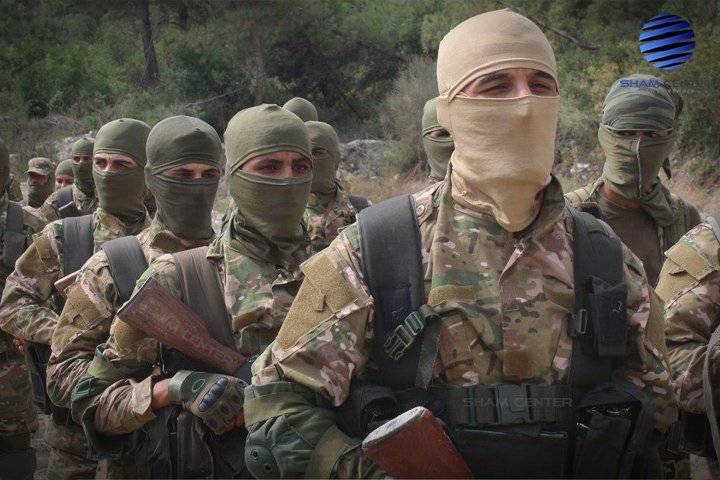
However, we recall that when the forces of the international coalition led by the United States launched their offensive in the area of Mosul and Raqqah, which caused a humanitarian catastrophe of enormous proportions (tens of thousands of civilian casualties and, according to various estimates, from 0,8 million to 2 million refugees ), for some reason, they did not consult with anyone on this issue and preferred not to notice the persistent recommendations from Damascus and Moscow to act more gently and selectively.
Further, let us remind ourselves that, in addition to civilians, the Idlib enclave is full of various groups of Islamic radicals, including those recognized by the international community as terrorist, and the number of militants there amounts to tens of thousands. This information was confirmed by the special envoy of the UN Secretary-General for Syria, Jan Egeland.
Of course, the idlib de-escalation zone is one of those regions of Syria that Russia, Iran and the same Turkey agreed upon during negotiations with a number of Syrian opposition groups in Astana. However, these agreements do not apply to terrorists and extreme extremists, and since these "comrades" are present in the above-mentioned zone in more than "commodity quantities", Damascus has the full right to conduct an offensive operation in this area.
It is clear that this operation will really cause a huge new wave of refugees, who, based on the geographical position of Idlib, will be forced to go only to Turkey. Since there are, according to various estimates, from 3,5 to 5 million Syrian refugees, the new wave from at least 1 million people will turn into a new migration nightmare for Turkey and for Europe.
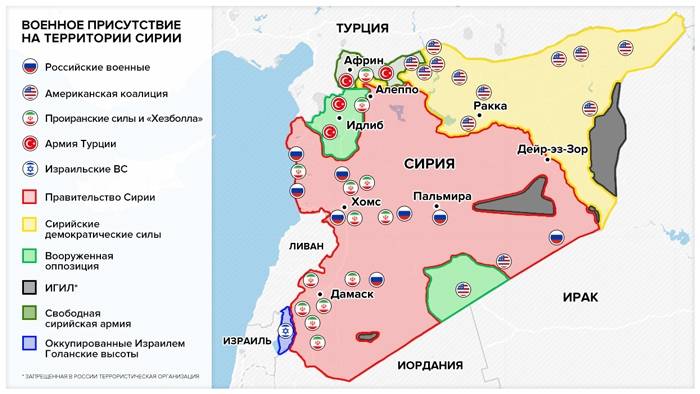
Proceeding from this, in order not to provoke a new humanitarian crisis, Ankara is trying with all its might to dissuade Moscow, Tehran and Damascus from an offensive in the northern regions of Syria. And it can be said that for this 7 September 2018 is convened by Recep Tayyip Erdogan an international summit with the participation of Russia, France, Germany and other countries. The main topics of the talks are the prevention of a humanitarian catastrophe, the restoration of the Syrian economy and civilian infrastructure, as well as the related problem of the return of refugees. Also, without a doubt, one of the key issues will be the trilateral talks Russia-Iran-Turkey on the problems of military cooperation, as well as relations with other external players in the Persian field.
Argument # 2: the need for Turkey to create a spatial "strategic depth" as a factor against the Kurds
Of course, besides humanitarian issues related to refugees, there are several other reasons why Ankara takes an extremely sharp position regarding the military-strategic plans of Damascus, Moscow and Tehran. In particular, based on the agreements reached in Astana, the Turks created several military bases and many observation and fortification points in Northern Syria, “staking out” thereby their zone of influence and the zone of their strategic interests.
In addition, the Turkish leadership has dense and long-standing ties with a number of radical groups (mainly included in the so-called "National Front for the Liberation of Syria"). Moreover, Ankara has a very ambivalent (in contrast to Damascus, Moscow and Tehran) attitude to the Hayat Tahrir ash-Sham group dominant in the Idlib zone, which, as we know, is the rebranding of Al-Nusra (both groups are prohibited in Russia ).
In particular, the government of Erdogan, apparently, plans to negotiate with all participants in the process, including the former "An-Nusrovtsy" themselves, about their peaceful transition to the camp of "moderate opposition" or even about the surrender of at least heavy weapons by the militants of this group. According to the Turkish plan, foreigners in the ranks of Hayat Tahrir should be given the opportunity to freely return to their countries, and the most radical representatives of this group should be given the opportunity to evacuate into a vast semi-desert zone at the junction of the borders of Syria, Jordan and Iraq, where there is one more major an enclave of anti-government forces.
In addition, for Ankara it is very important to have a “strategic spatial depth” in the north of Syria as a strategic argument against the Kurds who occupied the huge northeastern regions of this long-suffering country. The fact is that, judging by some data, recently, Moscow, Damascus and Tehran have been negotiating with some influential Kurdish politicians, led by the Peshmerga armed militia. Apparently, Russia primarily (after its consent to the occupation of Iraqi forces under the leadership of the United States of Northern Iraq, which put an end to the already existing independent Kurdistan), seeks to restore its reputation in the face of the Kurds and once again strengthen its influence on this people.
According to some assumptions, in exchange for the peaceful return of a number of Syrian regions, the alliance of Moscow, Damascus and Tehran will agree to the formation of a Kurdish state in the remaining territories. And Turkey, as is known, has always been and is the main opponent of the creation of Kurdish statehood. And the formation of a Kurdish republic in northeastern Syria will entail the likelihood of a number of areas out of Ankara’s power within the Turkish borders themselves.
In addition, there is a logical assumption that in the event of a peaceful and mutually beneficial solution of the Kurdish issue in Northeastern Syria, the militia forces of this belligerent people, along with Syrian government troops, can be involved in eliminating the centers that remain under the control of the militants in the east and southeast of this country .
Without a doubt, the idee fixe of the B. Assad government is the desire to liberate the entire territory of the state from a foreign military presence, but objective political realities can lead to a conclusion between Ankara, Damascus and the Kurds of a certain modus vivendi, which will finally extinguish the flames of war in these lands.
Likely scenarios
On the one hand, the aspiration of the B. Assad government for the complete liberation of the entire territory of its country, and not only from the “armed opposition” of various stripes, but also from the presence of Turks and Kurds, is supported by Moscow and partly by Tehran. However, the strategic interests of Turkey in Northern Syria are very large, which means that just because R.T. Erdogan will not leave there.
Accordingly, in the case of a forceful development of the situation without taking into account Turkish interests, there is a great chance of an armed conflict between Turkey and the militant forces of the Idlib enclave, on the one hand, and the government army of Syria, Russian videoconferencing forces and, possibly, Shiite detachments from Iran and Lebanon. As we remember, there is already a precedent for such a clash, and neither Ankara nor Moscow are interested in such a scenario.
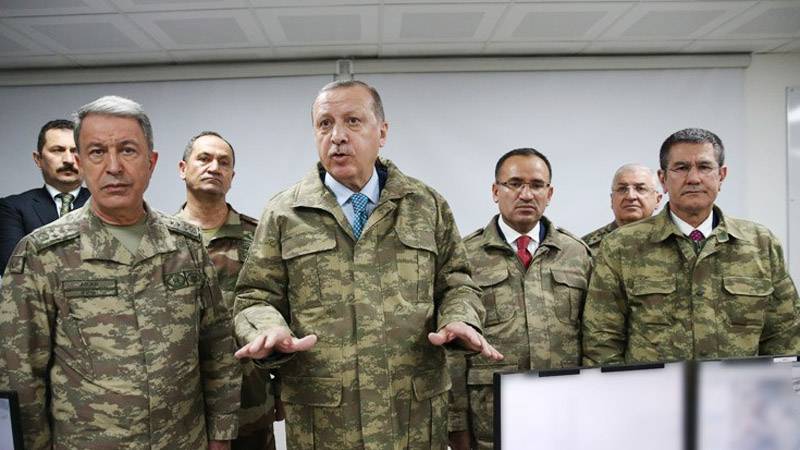
The situation is complicated even more by the presence of at least 12 strongholds erected by Turkey in the idlib de-escalation zone in which Turkish troops are deployed. Accordingly, while the Erdogan government does not give an indication of the withdrawal of forces, a military offensive on the area from the side of Damascus and its allies is almost impossible (except for targeted air strikes that have already begun).
It is difficult to say which decision the parties will come to at the opening September 7 September. Ankara, for its part, has already taken a number of steps with respect to the forces of the idlib “armed opposition” under its control. In particular, small groups of “moderates” were merged into one political platform, and the members of “Haiti Tahrir ash-Sham” received agreement even to start negotiations.
Note that, despite the obvious weakness in military terms in front of the Syrian, Iranian and Russian alliance, the government of R.T. Erdogan has very serious strategic interests in the region, which it will try to defend by all available methods.
Let us hope that the upcoming negotiations will lead to mutually beneficial agreements between key players, as a result of which the forces of international Islamic terrorism, still remaining in Syria, will be dealt a decisive blow.
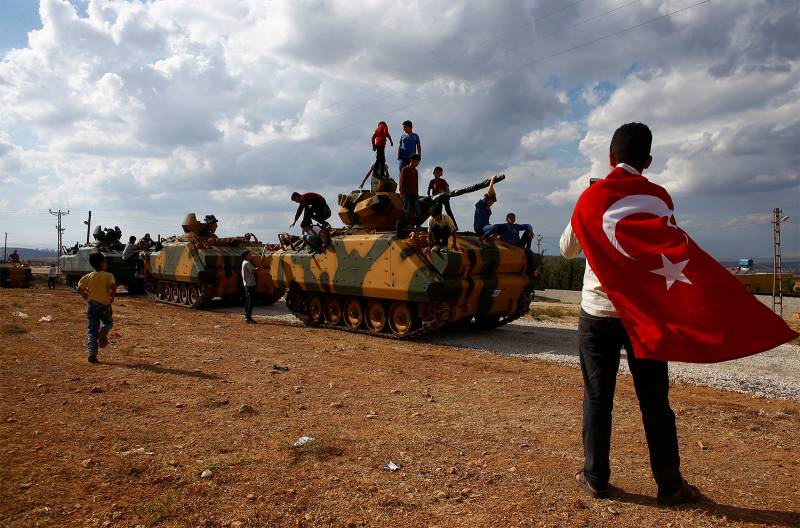
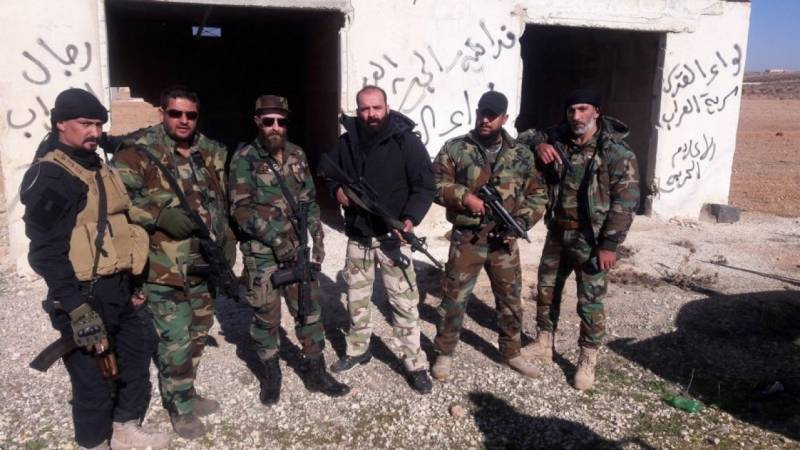
Information